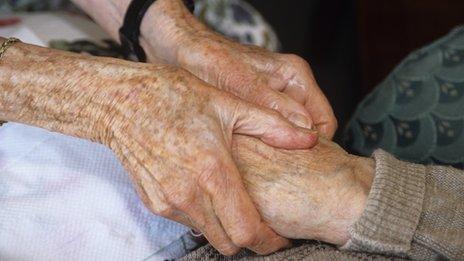Blaming care pathway 'like blaming Highway Code'
- Published

There is now debate over what should replace the Liverpool Care Pathway
For 10 years the Liverpool Care Pathway (LCP) was used to monitor care at the end of life, but negative media reports raised concerns it had led to poor care and even deaths - and last summer a panel led by the Baroness Neuberger decided that the LCP should no longer be used.
But writing in Scrubbing Up, Dr Claud Regnard, a consultant in palliative care medicine in Newcastle-upon-Tyne, suggests the media, government and Neuberger panel were wrong to blame the LCP and questions whether the ban was justified and will benefit patients.
The distressing stories of poor care presented to the panel looking into the LCP could not be ignored.
The panel rightly laid the blame at many different doors including poor communication skills, inadequate attention to the need for food and drink, questionable decision making and insufficient training.
These have been noted before in many reports or research papers and they always deserve repeating.
And yet, the report rejected the accusation that the LCP was a means of deliberately hastening someone's death and even praised it as an effective tool.
A University of Nottingham review that accompanied the report found no evidence that such pathways cause harm.
The panel did criticise checklists like the LCP, but was apparently unaware that used intelligently and compassionately they are crucial to ensure safety - on your next flight try telling the pilots they cannot use a checklist.
Many improvements in the care of dying patients in the last 45 years are thanks to hospice and specialist palliative care teams and, had they been included in the panel, the outcome for patients might have been different since there was nothing in the report to justify banning the LCP.
The LCP wasn't perfect - nothing ever is. But it had improved over 10 years and could have been improved further.
The LCP never required patients to be denied food or drink and never demanded that patients be sedated.
When these happened inappropriately they occurred because of poor decision making, not because of the LCP.
Care 'vacuum' risk
The LCP did require patients to be regularly monitored for any sign that they might improve and benefit from treatment to reverse the cause.
It also required carers to communicate clearly and work in partnership with the patient and relatives.
Ignoring these requirements happened because of poor skills and training, not because of the LCP.
The Neuberger report wanted the LCP phased out by July this year, but it is now clear that no-one wants to create a replacement that may be banned by a future similar panel.
The consequence will be a vacuum in monitoring care with the risk that poor care continues without hindrance.
It was easy to make the LCP a scapegoat, but this has been a disservice to dying patients. Banning the LCP was like banning the Highway Code because of a few bad drivers.
What now?
Relatives who received excellent care under the LCP have already expressed their surprise at the ban.
Many health professionals are frustrated at the loss of the LCP, and some fear that that care of the dying may be set back years.
But one recommendation in the Neuberger report may provide a way forward: to set up a national leadership alliance to improve end of life care.
There are cases of poor care, but there is also a remarkable amount of compassionate care that still exists in all health care settings with a determination amongst health professionals to work in partnership with patients, partners and families.
Some good may come from this, despite the decision to ban the LCP.
- Published15 July 2013
- Published15 August 2013
- Published13 July 2013
- Published1 November 2012